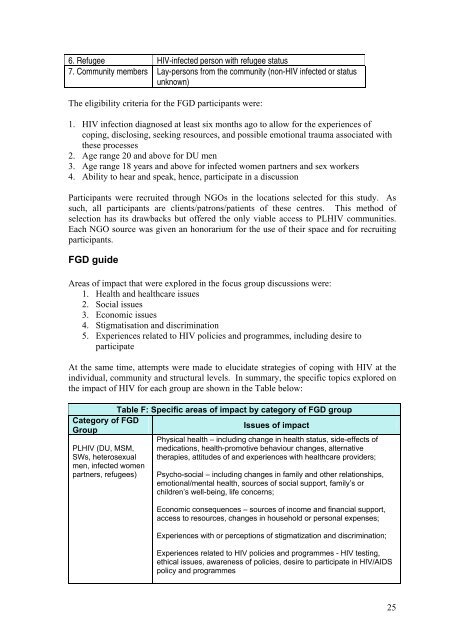Download this publication - AIDS Data Hub
Download this publication - AIDS Data Hub
Download this publication - AIDS Data Hub
Create successful ePaper yourself
Turn your PDF publications into a flip-book with our unique Google optimized e-Paper software.
6. Refugee HIV-infected person with refugee status7. Community members Lay-persons from the community (non-HIV infected or statusunknown)The eligibility criteria for the FGD participants were:1. HIV infection diagnosed at least six months ago to allow for the experiences ofcoping, disclosing, seeking resources, and possible emotional trauma associated withthese processes2. Age range 20 and above for DU men3. Age range 18 years and above for infected women partners and sex workers4. Ability to hear and speak, hence, participate in a discussionParticipants were recruited through NGOs in the locations selected for <strong>this</strong> study. Assuch, all participants are clients/patrons/patients of these centres. This method ofselection has its drawbacks but offered the only viable access to PLHIV communities.Each NGO source was given an honorarium for the use of their space and for recruitingparticipants.FGD guideAreas of impact that were explored in the focus group discussions were:1. Health and healthcare issues2. Social issues3. Economic issues4. Stigmatisation and discrimination5. Experiences related to HIV policies and programmes, including desire toparticipateAt the same time, attempts were made to elucidate strategies of coping with HIV at theindividual, community and structural levels. In summary, the specific topics explored onthe impact of HIV for each group are shown in the Table below:Category of FGDGroupPLHIV (DU, MSM,SWs, heterosexualmen, infected womenpartners, refugees)Table F: Specific areas of impact by category of FGD groupIssues of impactPhysical health – including change in health status, side-effects ofmedications, health-promotive behaviour changes, alternativetherapies, attitudes of and experiences with healthcare providers;Psycho-social – including changes in family and other relationships,emotional/mental health, sources of social support, family’s orchildren’s well-being, life concerns;Economic consequences – sources of income and financial support,access to resources, changes in household or personal expenses;Experiences with or perceptions of stigmatization and discrimination;Experiences related to HIV policies and programmes - HIV testing,ethical issues, awareness of policies, desire to participate in HIV/<strong>AIDS</strong>policy and programmes25















